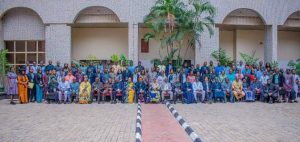Stakeholders have endorsed a long-term low-emission strategy as part of efforts to meet Nigeria’s carbon reduction objective by 2060 and steer the country toward a more sustainable future.

The report, according to them, stands as a visionary blueprint, a testament to the nation’s commitment to transitioning into a more resilient, greener, and inclusive economy.
“I stand before you,” Dr. Salisu Dahiru, director general of the National Council on Climate Change (NCCC), remarked, “to introduce Nigeria’s Long-Term Low Emission Development Strategy 2060 for national stakeholder validation.”
Dr. Dahiru, who made the statement at a workshop organised by the NCCC in collaboration with the 2050 Pathways Platform on Tuesday, November 14, 2023, in Abuja, added that the new document reaffirms Nigeria’s commitment to reduce emissions by 20 percent unconditionally by 2030 and 47 percent conditionally if international partners provide support.
He went on to explain that the long-term low emission strategy will serve as a supporting tool for the country’s Nationally Determined Contributions (NDCs) under the Paris Agreement on climate change.
In the global context, the urgency to combat climate change and forge a sustainable path for the future has never been more critical, the NCCC’s chief hinted, to highlight that Nigeria recognises the gravity of this challenge and has embraced its responsibility to act and innovate to foster resilience in the face of this life-threatening disaster.
Chris Nwonta, House Committee Chairman on Climate Change, described the event as a significant step towards defining Nigeria’s low-emission development pathways for a more resilient future against the catastrophic effects of climate change.
“The ambitious target of the document sets a sustainable path to cleaner air, enhanced health, inclusivity, food security, green job creation, improved livelihoods, and a circular economy as the major pivotal pathways,” he said.
Country director of the French Development Agency (FDA), Pascal Grangereau, restated their full commitment to the Paris Agreement, drawing attention to several sustainable projects that his agency has implemented in the country.
“We are committed to financing the deep-decarbonization pathway in Nigeria, he said, both at the mitigation and adaptation levels.
Prof. Chuks Okereke, who lead of the LT-LEDS Mitigation Modeling/DDP project, presented a paper on Nigeria’s emission profile and its mitigation pathway, showing how industry frameworks and smart technologies can help create new sustainable sectors and accelerate a just transition.
Nigeria is among the 68 countries that have developed LT-LEDS to transform the goals of the Paris Agreement with a long-term vision to address climate issues. The three building blocks for strategy development include operationalisation, elaboration, and laying a foundation through policy and regulation, financial investments, and socialisation.
The LT-LED mission is to make reality frameworks for NDCs alignment, seeking to achieve carbon neutrality to avoid climate catastrophe.
By Nsikak Emmanuel Ekera, Abuja
